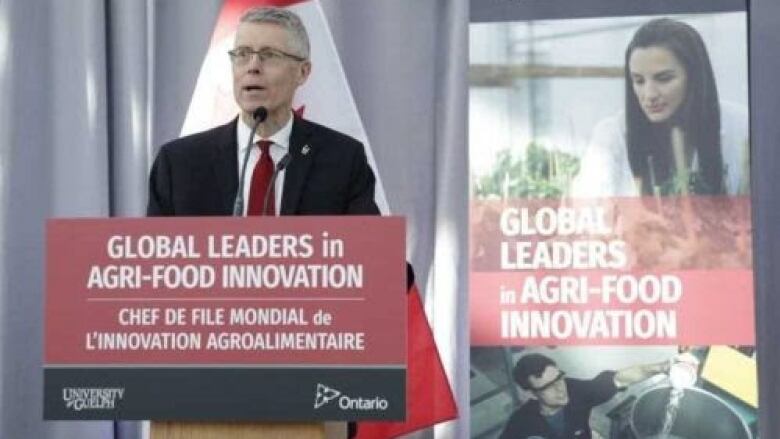Province invests $713M in University of Guelph
Renewed agreement 'will position Canada as a world leader in agri-food', says U of G president

The Ontario government has renewed a ten year agreement with the University of Guelph and Ontario Ministry of Agriculture, Food and Rural Affairs (OMAFRA) to build on agri-food research, agriculture and new advances in artificial intelligence.
- University of Guelph postpones decision to divest from fossil fuels
- Farmers play 'societal' role with tighter antibiotic rules in 2018, says prof
FrancoVaccarino, the president of the university, said in a statement the renewed $713 million to the program will position Canada as a world leader in agri-food.
"Scientific research is critical to developing innovations that benefit people, animals and the environment," said Vaccarino.
"Agri-food innovation also attracts investment and highly skilled talent, making the economy more robust, creating jobs and sustaining strong communities."
Ontario's Agri-food sector employs 800,000 people and contributes $37 billion to the economy.
How the money has been spent
The previous agreement between OMAFRA and U of G has led to a number of innovations:
- New detection methods and management systems for diseases such as avian influenza and biocontainment facilities. Researchers study highly hazardous food and animal-to-human pathogens and viruses such as West Nile virus and tuberculosis, and lower-level pathogens, such as coli 0157:H7, Salmonella and Listeria, in a safe and secure environment
- The world's first compostable coffee pod, PurPod100.
- Governor General's Award for Innovation-winning technology to identify and breed cows with better immunity to diseases, reducing antibiotic use and saving livestock producers millions of dollars annually
- A national research group studying cropping practices that mimic natural ecosystems and improve resiliency to climate change
- The commercialization of discoveries and innovations via Gryphon's LAAIR (Leading to the Accelerated Adoption of Innovative Research). Researchers pitch their ideas to a panel of industry experts and business managers; winners receive grants to turn ideas and discoveries into a marketable product or technology
- Research on biocarbon and other unconventional fuels to improve efficiency and sustainability
- A natural formula, hexanal, to prolong the shelf life of fresh produce
- Smartphone applications that identify and control field pests
According to the U.S. News & WorldReport, the University of Guelph ranks first inCanada and 14th in the world for agricultural science.
Meanwhile, the Ontario Veterinary College is first in Canada, third in North America and sixth worldwide among veterinary colleges in a ranking by Quacquarelli Symonds.
The University's $77-millionFood from Thoughtresearch project, funded by the federal government in 2016, is creating novel tools for producing more and safer food while also protecting the environment.
U of G and OMAFRA established an enhanced agreement in 1997; it was renewed for 10 years in 2008. The new agreement will take effect April 1, 2018.












_(720p).jpg)


 OFFICIAL HD MUSIC VIDEO.jpg)
.jpg)



























































































